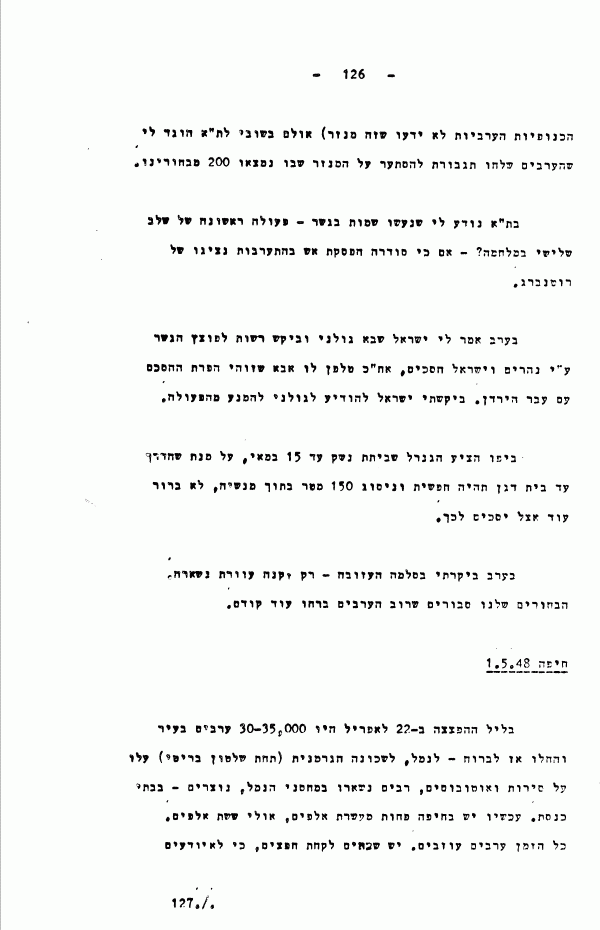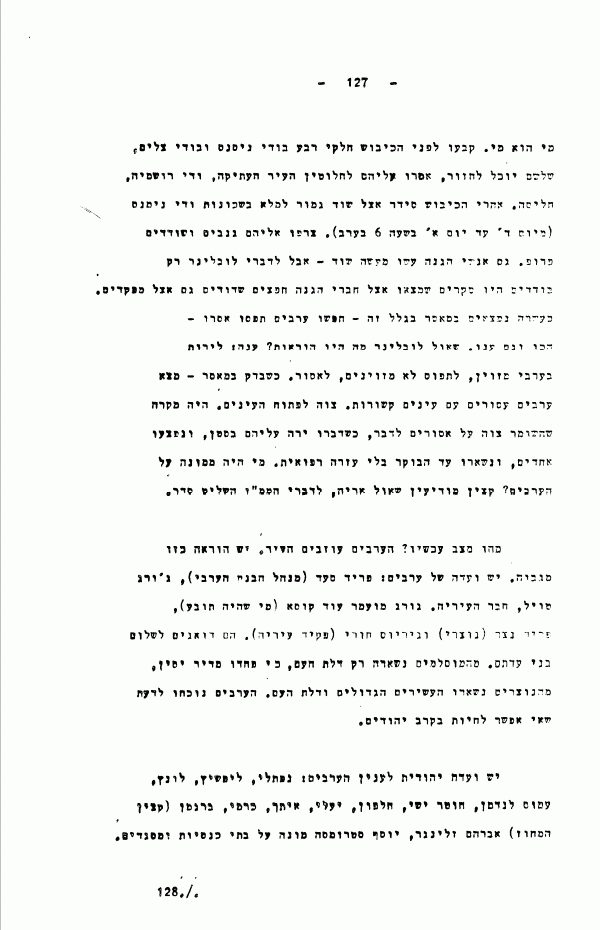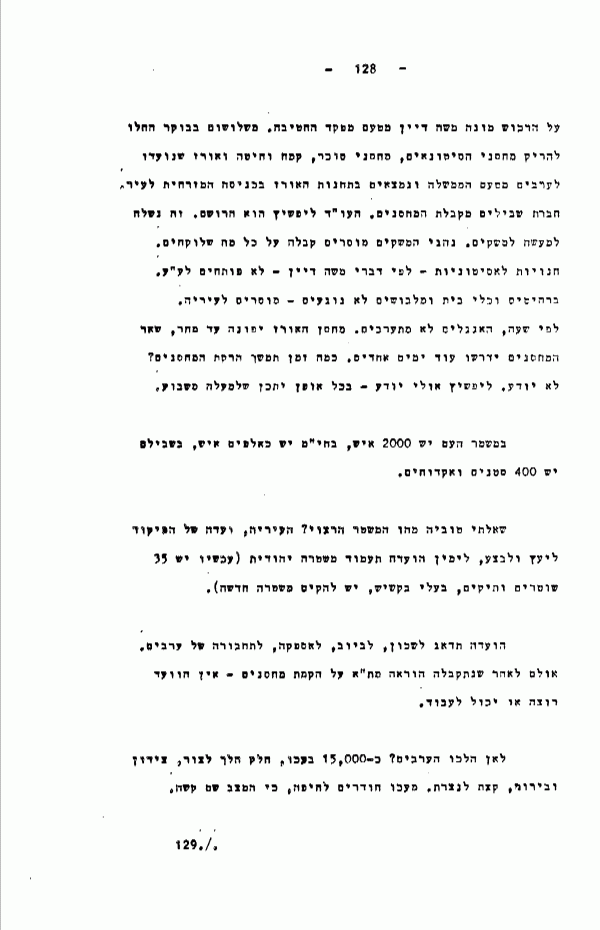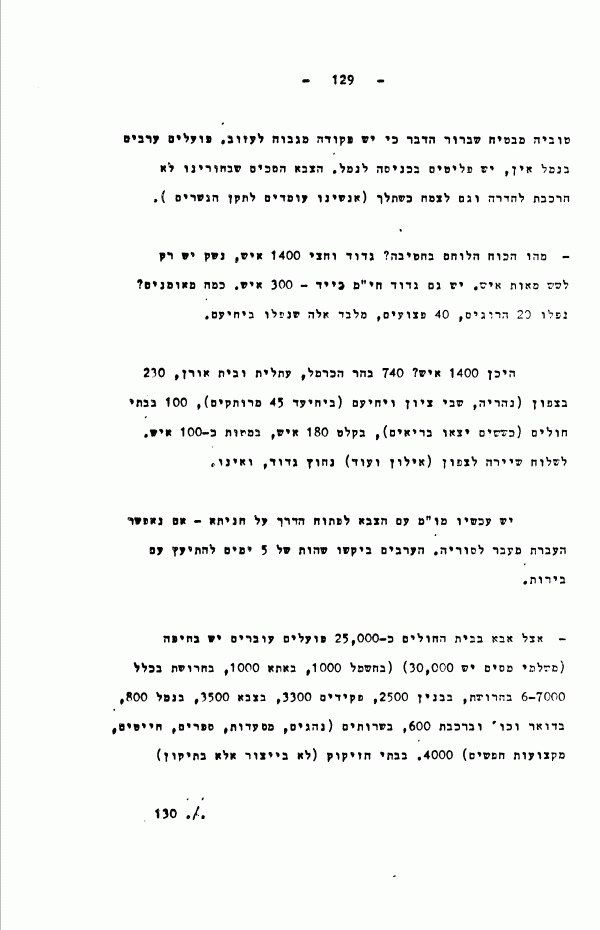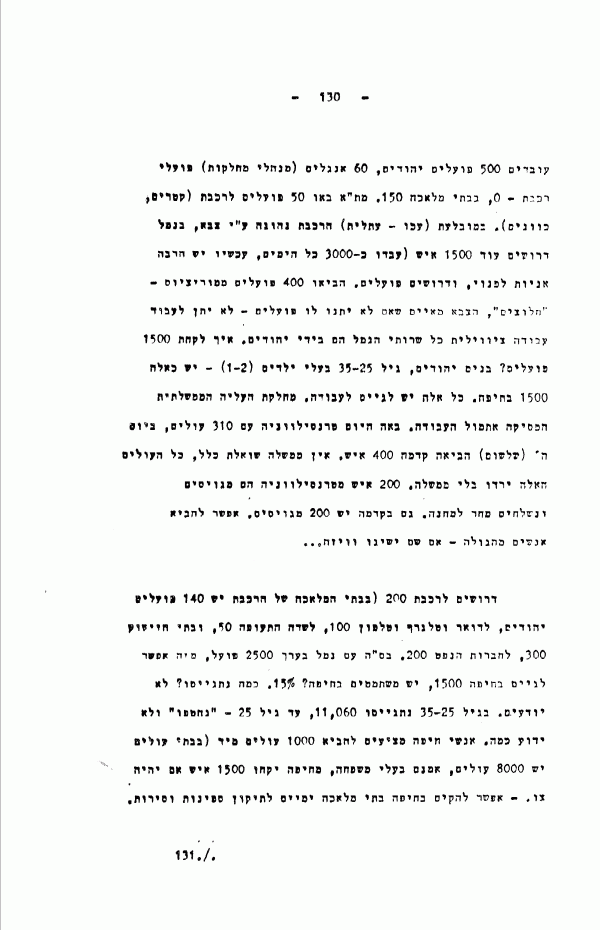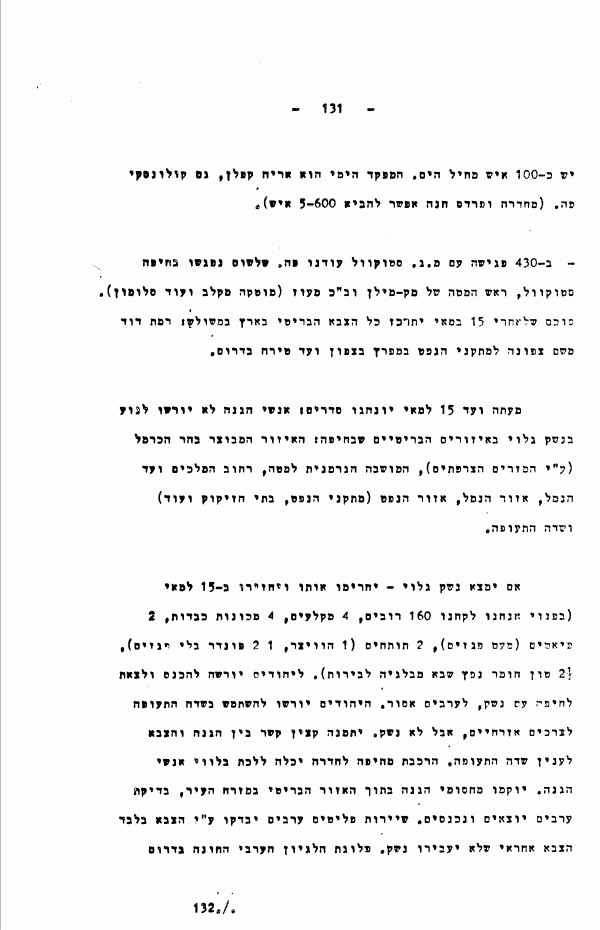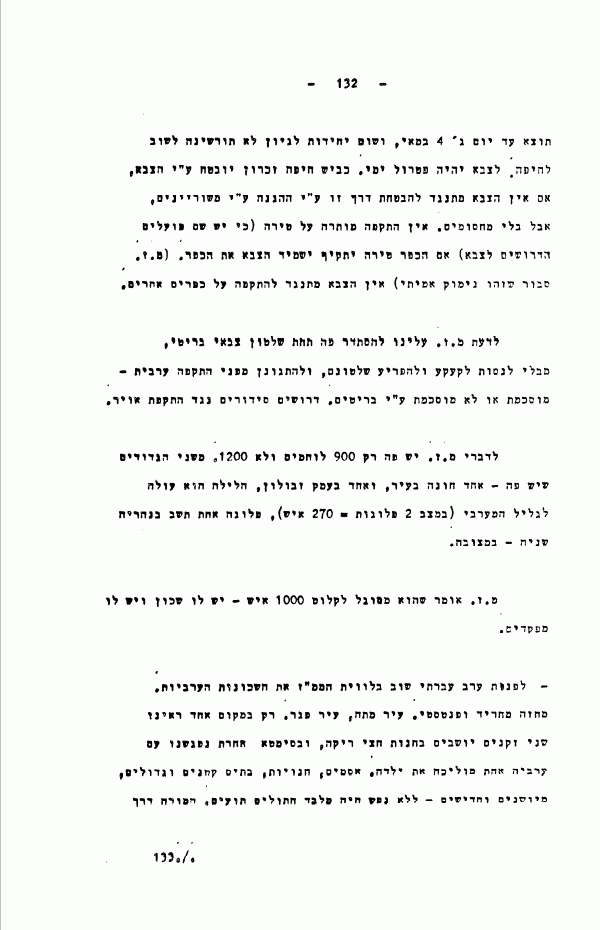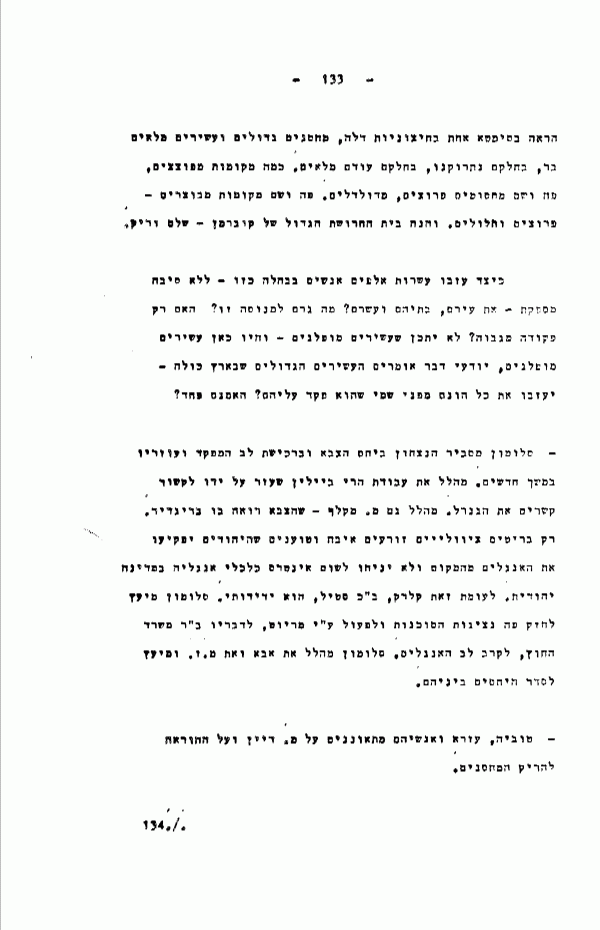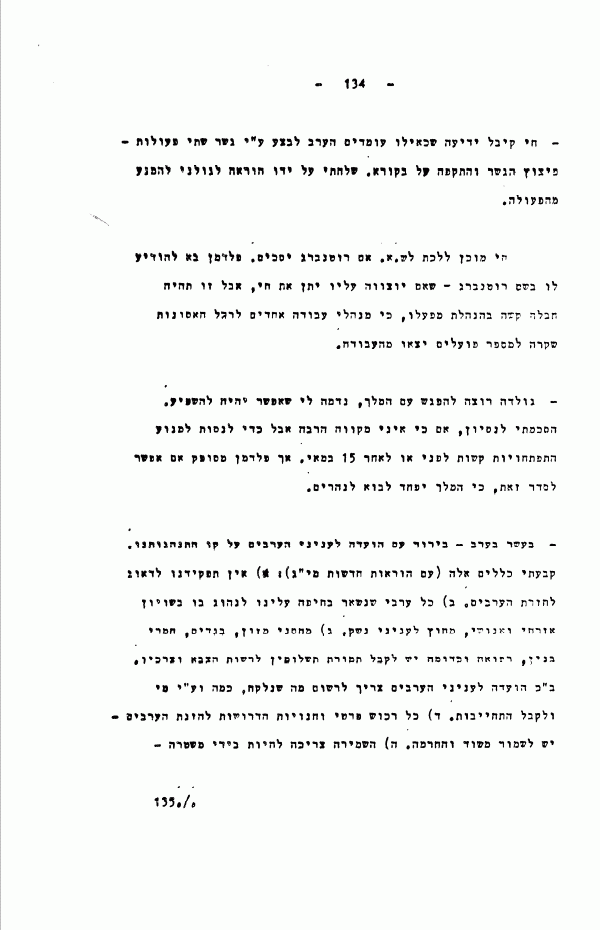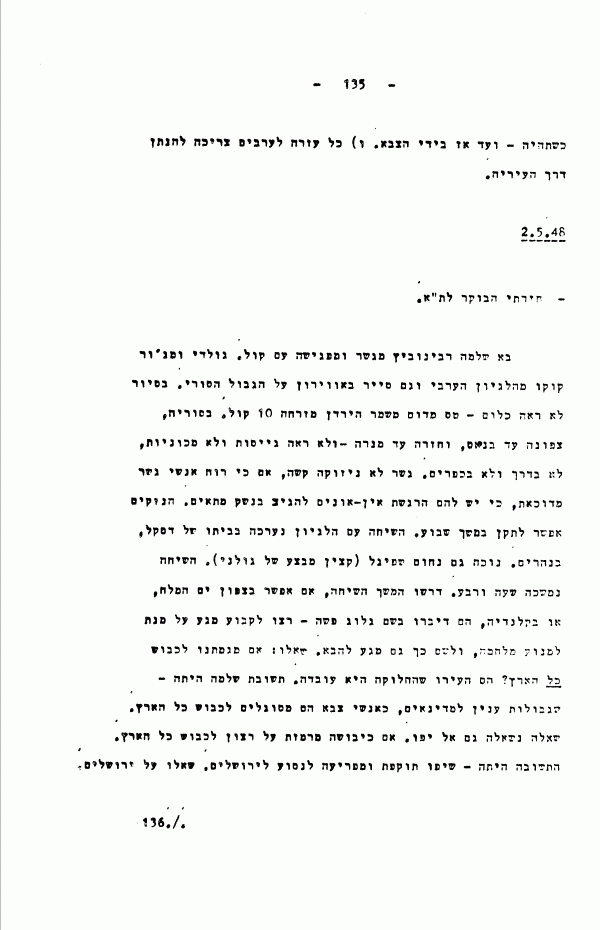Haifa, May 1, 1948
On April 22, the night of the bombardments [carried out by mortar shells as the city was being occupied], there were 30,000-35,000 Arabs in [Haifa] and they began to flee-to the port, to the German Colony (which was under British control), where they boarded boats and buses. Many remained at the port warehouses. Christians-in churches. Now fewer than ten thousand [Arabs], maybe six thousand, remain in Haifa. Arabs are leaving all the time. Some come [back] to take things-but they're not letting them take things because they don't know who's who. Before the city was captured, they designated semi-neighborhoods in Wadi Nisnas and in Wadi Salib, to which they could return. They were totally banned from the Old City and Wadi Rushmiyya, Halisa. After the conquest, the IZL embarked on total outright looting in the Wadi Nisnas quarter (from Wednesday to Sunday at 6:00 p.m.), joined by professional thieves and robbers. Haganah people also looted-but according to Lubliner [Jacob Lublini] [??] only a few. There were cases where Haganah members, including commanders were found with loot their possession. About ten are in detention for this reason. They looked for Arabs and captured, detained, beat, and tortured [them], too.
I asked Lubliner: What were the instructions?-Hs answered: shoot an armed Arab, capture and detain unarmed ones. When he examined [the place of] detention-he found a few Arabs blindfolded. There was a case in which the guard ordered prisoners not to speak, and when they spoke he opened fire on them with a Sten, wounding several and leaving them without medical aid until morning.
Who was in charge of the Arabs? The intelligence officer Shaul Arye. According to the [district commander], he cracked down.
What's the situation now? The Arabs are leaving town. Some kind of command from above [from the Arabs' leaders] was given. There's a committee of Arabs [in the city]: Farid Sa'ad (manager of the Arab Bank), George Tawil, a member of the municipality, George Mu'ammar and Jeries Khoury (a municipal clerk), the attorney Koussa (a former prosecutor), Farid Nasser (a Christian), Victor Khayyat-a rich bigshot. They're looking out for their community. Only the hardscrabble Muslims remain because they are afraid of [meeting the fate of] Deir Yassin. Among the Christians, the rich bigshots and the hardscrabble remain. The Arabs realized that it's impossible to live among Jews.
There's a Jewish committee for this matter of the Arabs: [the attorney] Naftali Lifschitz, [Matityahu] Lunc, Amos Landmann, [the attorney Aharon] Hoter-Yishai, [Avraham] Halfon, [Avraham] Ya'eli, Otek, [??] [Ze'ev] Carmi, [Yaakov] Bergman (the District Officer), Avraham Selinger. Yosef Stroumsa was placed in charge of synagogues and mosques. Moshe Dayan was placed in charge of property, representing the brigade commander.
Since the morning of [April 29], they've been emptying out the wholesalers' warehouses, the warehouses of sugar, flour, wheat, and rice that the government intended for the Arabs; they are at the rice mills at the eastern entrance to town. The Shevilim company is receiving the warehouses. Attorney Lifschitz is keeping the records. The food is actually being sent to the meshakim [the kibbutzim]. The drivers from the meshakim give a receipt for everything they take. Non-wholesale shops-Moshe Dayan says-aren't opening for the time being. Furniture and housewares and clothing aren't being touched-they're turned over to the Municipality. For now, the British aren't intervening. The rice warehouse will be vacated by tomorrow. [Vacating] the rest of the warehouses will take a few more days.
How long will it take to empty out the warehouses?
I don't know. Maybe Lifschitz knows-in any event, probably more than a week.
There are 2,000 men at Mishmar Ha'Am. In the garrison force: about 2,000 men. There are 400 Stens and handguns for them.
- I asked Tuvia [Arazi, an Arab affairs intelligence officer in Haifa] what the desired Arab regime is.
The Municipality and a Command committee to advise and execute. A Jewish guard unit should stand at the committee's side (now there are 35 veteran police, some on the take. A new police force has to be set up). The committee should take care of Arabs' housing, sewerage, supplies, transport. But since the order about emptying the warehouses was received-the committee hasn't been willing, or able, to work.
Where are the Arabs going?
About 15,000 in Acre. Some went to Tyre, Sidon, Beirut, a few to Nazareth. From Acre they're returning to Haifa because the situation there is dire. Tuvia assures [me] that plainly [the Arabs] were ordered from above to leave. No Arab workers at the port; there are refugees at the entrance to the port.
The army agreed that our guys would escort the train to Hadera and also to Tsemah, when it goes. (Our people are about to repair the bridges.)
What fighting force does the brigade have?-a battalion and a half, 1,400 men. Enough weapons for only 600 men. There's also a mobile garrison battalion-330 men. How many are trained?-20 fell, 40 were wounded, apart from those who fell in [the] Yehiam [convoy].
Where are the 1,400 men?-740 in the Carmel mountains, Atlit, and Bet Oren, 230 in the north (Nahariya, Shave-Tsiyyon, and Yehiam) (at Yehiam, 45 are pinned down), 100 in hospital (about sixty came out healthy), 180 men at intake, around 100 at headquarters. One needs a battalion to send a convoy to the north (Eylon, etc.), and there's none.
Now there are negotiations with the army about opening the way as far as Hanita-if we'll allow [the Arabs] to cross into Syria [via Lebanon]. The Arabs asked for a five-day stay in order to consult with Beirut.
- [I visited] Abba Khoushy in the hospital. About 25,000 Hebrew workers in Haifa (the Haifa Labor Council has 30,000 taxpaying members), 1,000 at [the] Electric [Company], 1,000 at Ata, 6,000-7,000 in manufacturing all told, 2,500 in construction, 3,300 white-collar, 3,500 [working] in the army, 800 at the port, the posts, etc., and 600 for the railroad, 4,000 in services (drivers, restaurants, barbers, tailors, liberal professions). 500 Jews work at the refineries (not in production but in repairs); 60 British (department managers), railroad workers-zero, 150 in workshops. From Tel Aviv, 50 workers came to the railroad-locomotive [drivers], linemen.
In the enclave (Acre-Atlit), the army is running the railroad. The port needs 1,500 additional workers. (There used to be around 3,000 permanent workers.) Now there are lots of ships to unload and workers are needed. They brought 400 workers from Mauritius-"halutsim" [a literal translation of "pioneers; in actuality they are military "freelancers"]. The army threatens not to let civilian work take place unless it's given workers.
All port services are in Jewish hands. How can 1,500 workers be mobilized? Lone sons aged 25-35, fathers (1-2)-there are 1,500 like them in Haifa. All should be inducted for labor.
The government's immigration department stopped working yesterday.
The [S.S.] Transvylania arrived today with 310 immigrants. On Thursday (two days ago), the Kedma brought 400. The government isn't asking any questions; all the immigrants debarked without government. 200 people from the Transylvania have been inducted and will be sent to a camp tomorrow. Aboard the Kedma, too, 200 are being inducted. People can be brought from the Diaspora-if they can get a visa there….
The railroad needs 200 people (the railroad workshops have 140 Jewish workers), 100 for posts and telegraph, 50 for the airfield, 300 for the refineries, 2 00 for the oil companies = total including the port, roughly 2,500 workers. 1,500 of them can be inducted in Haifa.
Are there evaders in Haifa?-15%.
How many have been inducted?-They don't know. 11,060 of those aged 25-35, up to age 25-they've been "snapped up" [inducted directly into the units] and how many aren't known. The Haifa people propose bringing [inducting] 1,000 immigrants at once (there are 8,000 immigrants in the immigrants' homes, admittedly, they've got families). From Haifa they'll get 1,500, if an [induction] order is given.
Naval workshops to repair ships and boats can be established in Haifa. There are about 100 men from the navy. The naval commander is Aryeh Kaplan, [Captain Yosef] Guldenski is here, too. 500-600 men [from the immigrant camps] in Hadera and Pardes-Hannah can be brought.
- At 4:30, a meeting with Moshe Zelicki [Carmel]. [The British commander in Haifa, General Hugh] Stockwell, is still here. Two days ago, Stockwell, the chief of staff of [General Gordon] MacMillan [the British military commander in Palestine], and representatives of the district commander (Mottke Makleff and the attorney [Jacob] Salomon) met in Haifa. It was agreed that after May 15 the whole British army in the country will mass within a triangle: Ramat David, from there northward to the oil facilities in [Zebulun] Bay and as far as Tira [Tirat Hacarmel] to the south.
From now until May 15, arrangements will be introduced: Haganah men will not be allowed to circulate with weapons in plain sight in the British areas of Haifa: the fortified area on Mount Carmel (next to the French convents), from the German Colony down, from HaMelakhim Street to the port, the port area, the oil area (the oil facilities, the refineries, etc.), and the airfield (at the bay).
If exposed weapons are found-they'll be confiscated and returned on May 15 (in the Arab evacuation we took 100 rifles, 4 machine guns, 4 heavy machine guns, 2 PIATs (several shells), 2 cannon (1 howitzer, 1 [antitank] 2-pounder without shells), 2½ tons of explosives that came from Belgium to Beirut. Jews will be allowed to enter and leave Haifa with weapons, Arabs not.
Jews will be allowed to use the airfield for civilian needs but not [to carry] weapons. A liaison officer between the Haganah and the army in regard to the airfield will be appointed.
The train from Haifa to Hadera can go with a Haganah escort.
Haganah checkpoints will be set up in the British zone on the eastern part of town in order to inspect Arabs as they exit and enter. Convoys of Arab refugees will be checked by the army only. The army is in charge of making sure they don't transfer weapons.
The Arab Legion company that's encamped in the south [near Tira] will be removed by Tuesday, May 4, and no Legion units will be allowed to return to Haifa. The army will have a naval patrol.
The Haifa-Zikhron [Ya'akov] road will be secured by the army, but the army does not oppose having the Haganah secure this road by means of armored vehicles but without checkpoints. No attack on Tira [village] is allowed. (This is because essential workers for the army are there. Moshe Zelicki [Carmel] believes this is the true explanation.) If Tira village attacks, the army will destroy it. The army does not oppose an attack on other villages.
In Moshe Zelicki's opinion, we should get along with British military rule here without trying to undermine and interfere with it, and we should defend ourselves against an Arab attack-consensual or not-by the British. Arrangements against attack from the air are needed.
According to Moshe, there are only 900 fighting men here and not 1,200. Of the two battalions here-one is encamped in the city and one in Zebulun Valley. Tonight it will be moving up to Western Galilee (really, two companies, 270 men). One company will sit in Nahariya, another-at Matsuba.
Moshe [Carmel] says he's able to intake 1,000 men-he has housing and he has commanders.
- Toward evening I crossed the Arab neighborhoods again, escorted by the district commander. A terrifying and fantastic spectacle. A dead city, a corpse-city. In only one place I saw two old men sitting in a half-empty shop, and on another lane we encountered an Arab woman out for a walk with her child. Granaries, shops, small and large houses, antiquated and modern-without a living soul other than stray cats. The guide showed [me], along an alley that looked scruffy, large and opulent warehouses filled with grain, some emptied and others still full. Several bombed-out places. Here and there-ruptured, thinned-out checkpoints. Here and there, fortified places-ruptured and gutted, but not the large Karaman factory-intact and empty. How did tens of thousands of people leave their city, their homes, and their wealth in such a panic and for no adequate reason? What caused this flight? Was it only an order from on high? It doesn't stand to reason that fantastically rich people-and there were fantastically rich people here, those in the know say, the richest in the whole country-would leave all their wealth behind because someone told them to. Was it really fear?
- The attorney Ya'akov Salomon traces the victory to the attitude of the army and to having won over the commander and his aides over a period of months. He lauds the work of Harry Beilin, who helped him to form relations with the general. He also praises M. Makleff-whom the commander of the army regards as "Brigadier Mottke." Only civilian Brits are sowing enmity and claiming that the Jews are going to kick the British out of here and allow no British economic interest in a Jewish state. In contrast, Clark, representing the Steele [brothers], is friendly. Salomon recommends that we strengthen the [Jewish] Agency mission here and act by means of [Cyril] Marriott [the British consul in Haifa]. He says someone from the Foreign Office ought to reach out to the British.
Salomon praises Abba [Khoushy] and Moshe Zelicki [Carmel] and recommends that their relations be straightened out.
- Tuvia [Arazi], Ezra [Danin] and their people [from the Arab intelligence service] are complaining about M. Dayan and the order to empty out the warehouses.
- Hai [Yissacharov] got word that [our forces] are heading out this evening for two operations near [Kibbutz] Gesher-blowing up the bridge [over the Jordan] and attacking Al-Baqoura [across the Yarmouk, opposite Ashdot Ya'akov]. I sent an order to the Golani [Brigade], by means of Hai, to refrain from acting.
Hai is willing to go to S.A. [Sherut Avir, the Air Service]-if Rutenberg [manager of the Electric Company] agrees. [Ya'akov] Feldman came in order to inform me in Rutenberg's name-that he'll give [me] Hai if I order him to go, but it will deal a severe blow to the management of his enterprise because some of his foremen have left the job due to disasters that befell several workers. Golda [Meir] wants to meet with King [Abdallah]. She thinks some influence may be had. I agreed to try. I don't have high hopes but it's worth trying to head off harsh developments before or after May 15. But Feldman doubts the possibility of arranging this because the king will be afraid to come to Naharayim.
- At ten in the evening-an inquiry with the Arab Affairs Committee [in Haifa] about the policy that guides our conduct. I laid down these rules (along with new orders from the yod-gimmel): (a) It is not our job to see to the Arabs' return. (b) We should treat every Arab who stayed in Haifa with civil and human equality except where weapons are concerned. (c) The warehouses of food, clothing, building materials, medical materials, and so on will made available to the army and its needs, for payment. The representative of the Arab Affairs Committee should record what's been taken, how much, and by whom, and should commit to paying up. (d) All private property and shops that the Arabs need for their sustenance should be protected from looting and confiscation. (e) Protection should be provided by the police-as soon as there are any-and by the army until then. (f) All assistance to the Arabs should be given via the Municipality.





